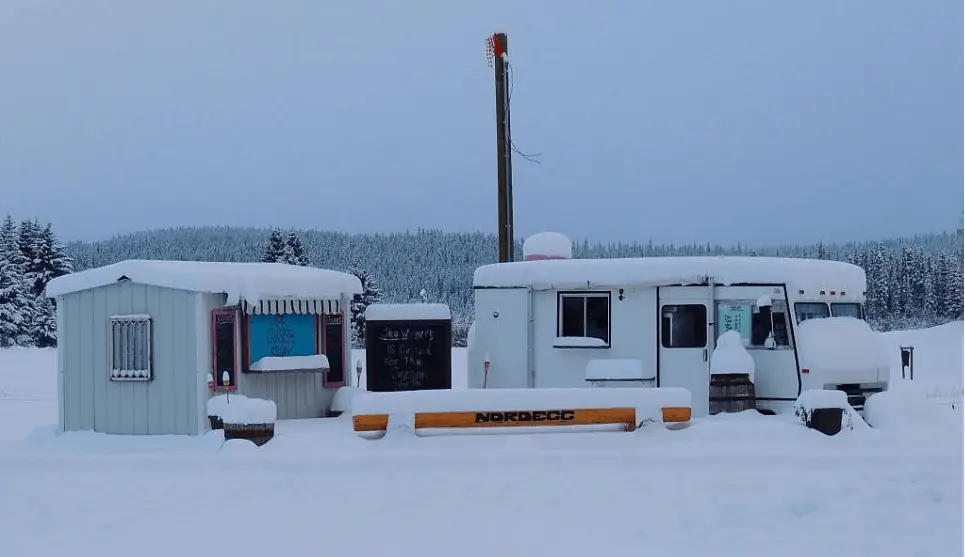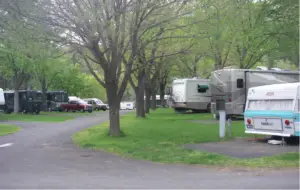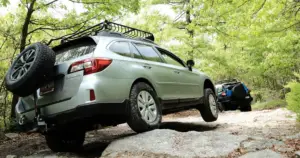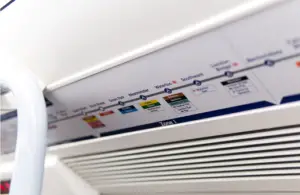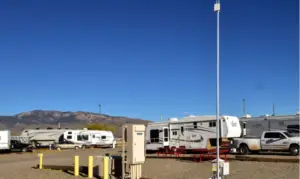Water hoses are a vital part of any recreational vehicle or RV. They provide the freshwater needed for cooking, cleaning, and drinking.
Unfortunately, water hoses can freeze in cold weather, leading to several problems. If your RV water hose has frozen, you can do a few things to unfreeze it.
How to unfreeze an RV water hose.
Use a heated water hose.
If you live in an area where it gets cold, you may want to invest in a heated water hose. These hoses have a heating element that keeps the water inside from freezing.
Insulate your RV water hose.
You can also try insulating your RV water hose to prevent it from freezing. Wrap the hose in insulation material, such as foam pipe insulation or a blanket.
Place your RV water hose inside your RV.
If possible, you should try to place your RV water hose inside your RV when it is cold outside. This will help to keep the hose from freezing.
Use a water heater.
If you have a water heater, you can use it to keep your RV water hose from freezing. Place the hose in the water heater and turn it on. The heat from the water heater will help prevent the hose from freezing.
Use an antifreeze solution.
You can also use an antifreeze solution in your RV water hose to help prevent it from freezing. Add the antifreeze solution to the hose and then turn on the water. The antifreeze solution will help to keep the water from freezing.
Use a hose heater.
If you have an electric hose heater, you can use it to keep your RV water hose from freezing. Place the hose heater around the RV and turn it on. The heat from the hose heater will help prevent the hose from freezing.
Use a water line heater.
If you have a water line heater, you can use it to keep your RV water hose from freezing. Place the water line heater around the RV and turn it on. The heat from the water line heater will help prevent the hose from freezing.
Use a hairdryer.
If you have a hairdryer, you can use it to keep your RV water hose from freezing. Place the hairdryer so that it is blowing on the hose and turn it on. The heat from the hairdryer will help to prevent the hose from freezing.
Use a space heater.
If you have a space heater, you can use it to keep your RV water hose from freezing. Place the space heater to blow on the hose and turn it on. The heat from the space heater will help prevent the hose from freezing.
Use a heat lamp.
If you have a heat lamp, you can use it to keep your RV water hose from freezing. Place the heat lamp to shine on the hose and turn it on. The heat from the heat lamp will help prevent the hose from freezing.
Use a heating pad.
If you have a heating pad, you can use it to keep your RV water hose from freezing. Place the heating pad on or around the hose and turn it on. The heating pad heat will help prevent the hose from freezing.
Use a light bulb.
If you have a light bulb, you can use it to keep your RV water hose from freezing. Place the light bulb to shine on the hose and turn it on. The light bulb’s heat will help prevent the hose from freezing.
Use a heat gun.
If you have a heat gun, you can use it to keep your RV water hose from freezing. Place the heat gun to blow on the hose and turn it on. The heat from the heat gun will help prevent the hose from freezing.
Following these tips, you should be able to prevent your RV water hose from freezing. However, if your RV water hose does freeze, you can use one of the methods above to unfreeze it.
Signs of a Frozen RV Water Hose.
There are a few signs that you can look for to tell if your RV water hose is frozen.
The hose is hard to touch.
When an Rv water hose is hard, this is one of the first signs that it is frozen. If you can’t squeeze the hose or feel it abnormally hard, this is a good indication that it is frozen.
The hose is cracked.
Another sign of a frozen RV water hose is if the hose itself is cracked. If you see any cracks or holes in the hose, then it is likely that the water inside has frozen and expanded, causing the damage. If the hose is damaged, it will need to be replaced before you can use it again.
The hose is leaking.
This sign is a little more difficult to spot. If you notice your RV water hose leaking, it may be because the water inside is frozen. This can cause the hose to break or crack and result in a loss of water pressure. Turn off the water at the source and let the hose thaw out completely.
The hose is bulging.
Another sign that your hose may be frozen is if it starts to bulge. This is caused by the water inside the hose freezing and expanding. If you see this happening, it’s essential to take action.
The hose is frozen in place.
If you see that the RV water hose is frozen in place, this is another sign that it is frozen. The hose may be frozen to the ground, to the side of the RV, or another object.
There is no water coming out of the hose.
If you turn on the water and there is no water coming out of the hose, this is another sign that it is frozen. When the hose is frozen, the water inside is expanded and can block the flow of water through the hose.
The hose is kinked.
This sign is easy to spot. If you see that the hose is bent or crimped, then this could be the problem. Unkink the hose and see if water starts flowing through it again. If it does, then great! If not, then you may need to check for other issues.
The hose is frozen in a loop.
This is another sign of a frozen water hose. When the water inside the hose freezes, it expands and puts pressure on its sides. This can cause the hose to form a loop or bulge in the middle. If you see this happening, it’s essential to take action to unfreeze the hose as soon as possible.
If you see any of these signs, it is a good indication that your RV water hose is frozen, and you will need to take action to unfreeze it.
How long does it take to unfreeze pipes?
It depends on how much water is in the pipes, how cold it is outside and how well insulated your RV is. It could take 30 to 40 minutes to unfreeze pipes with a small amount of water in them and are located in a warm RV.
If the pipes are full of water and are located in an unheated garage, it could take several hours to unfreeze them.
Prevent pipes from freezing
There are several things you can do to prevent your pipes from freezing:
- Keep your RV warm. The warmer your RV is, the less likely your pipes will freeze.
- Insulate exposed pipes. Any pipes exposed to the cold air should be insulated to prevent them from freezing.
- Seal any cracks or gaps. Any cracks or gaps around doors or windows should be sealed to prevent cold air from coming in and causing the pipes to freeze.
- Disconnect any hoses. Any hoses connected to outdoor faucets should be disconnected and drained before the winter so that they don’t freeze and cause the pipes to burst.
- Let the cold water drip. Running water is less likely to freeze than still water, so letting the cold water drip from the faucet will help prevent the pipes from freezing.
- Keep cabinet doors open. Keeping the doors open to cabinets that contain plumbing will allow heat to reach the pipes and prevent them from freezing.
- Apply heat tape. Heat tape is electrical tape that can be wrapped around pipes to keep them from freezing.
- Use a space heater. Placing a space heater in an area with exposed pipes will help keep them from freezing.
What should I do if my pipes freeze?
If you think your pipes have frozen, the first thing you should do is call a plumber. If you can’t get ahold of a plumber, there are a few things you can do to try and thaw the pipes yourself.
Turn on the faucet: This will help release any pressure built up in the pipes and help prevent them from bursting.
Apply heat to the pipes: With a hairdryer, space heater, or even towels soaked in hot water, you can do this. Apply heat until the full water pressure is restored.
Never use an open flame: This could cause the pipes to burst.
Thaw the pipes gradually : If you turn on the faucet and apply heat to the pipes too quickly, it could cause them to burst. The gradual increase in temperature will help prevent this from happening.
Use a plunger: Using a plunger can help break up any ice formed in the pipes.
If you follow these tips, you should be able to unfreeze your pipes successfully.
How do you know if a frozen pipe has burst?
There are several warning signs of a busted pipe. The following are ten warning signs:
Discoloured and smelly water.
When water sits in a pipe for too long, it starts to form rust. This water will be a brown or red color and have an unpleasant smell.
No water pressure.
If you turn on your tap and no water comes out or only dribbles out, this is a sign that your pipes may be frozen.
Frost on pipes.
If you can see frost on any of the pipes in your RV, this is a sure sign that they are frozen.
Water leaks.
If you notice water leaking from any of the pipes in your RV, this is a sign that the pipe has probably burst and will need to be fixed as soon as possible.
Strange noises.
If you can hear strange banging, gurgling, or whistling noises coming from your pipes, this is a sign that they are frozen and may burst.
Higher than normal water bills.
If you notice that your water bill is higher than normal, this could be a sign of a water leak, which a frozen pipe could cause.
Mold or mildew.
If you notice mold or mildew in your RV, this could be a sign of a water leak.
Water spots on walls or ceilings.
If you notice water spots on your walls or ceiling, this is a sign of a water leak.
Peeling paint.
If you notice that the paint on your walls or ceiling is peeling, this could signify a water leak.
Sunken floors.
When you have a water leak, the water can seep into the floorboards and cause them to warp or sink. If you notice any of these warning signs in your RV, it’s important to take action immediately and call a plumber.
If you think that your pipes may be frozen, it is important to take action as soon as possible to prevent them from bursting
Call a plumber.
If you cannot thaw the pipe yourself, you should call a plumber to do it for you.
Final thoughts.
If you think that your pipes may be frozen, the best thing to do is call a plumber. If you cannot get ahold of a plumber, there are a few things you can do to try and thaw the pipes yourself.
However, if you are not confident in your ability to do this, it is best to leave it to the professionals. Frozen pipes can be dangerous and should be dealt with as soon as possible to prevent further damage.

